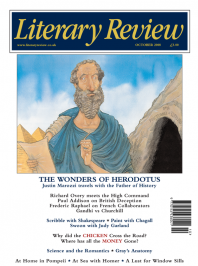Patricia Fara
Watchers of the Skies
The Age of Wonder: How the Romantic Generation Discovered the Beauty and Terror of Science
By Richard Holmes
HarperPress 554pp £25
Whatever C P Snow may have decreed about an unbridgeable divide between the Two Cultures, Romantic writers were fully aware of recent scientific discoveries. As a twenty-year-old medical student, John Keats spent a drink-fuelled night enthusing over a newly purchased verse translation of Homer’s Iliad. Early the next morning, he took less than four hours to set down his own famous poem, in which he compared his feelings with those of ‘some watcher of the skies/When a new planet swims into his ken’. Keats was referring to William Herschel, the astronomer who had effectively enlarged the solar system at the end of the eighteenth century by detecting a sixth planet, now known as Uranus, but initially named after George III. At school, Keats and his class mates had learnt about gravity through role play out in the yard: while one pupil remained stationary to act as the sun, the other child–planets circled round at different speeds and distances to form a living orrery, the human equivalent of the moving mechanical model so dramatically painted by the Enlightenment’s great artist of science and industry, Joseph Wright of Derby.
Wright’s famous picture of this astronomical instrument adorns the cover of Richard Holmes’s stellar collective biography, The Age of Wonder. Justly renowned as Britain’s greatest literary historian of the Romantic period, Holmes, in his latest book, gives a gripping account of the scientific research that inspired a sense of wonder

Sign Up to our newsletter
Receive free articles, highlights from the archive, news, details of prizes, and much more.@Lit_Review
Follow Literary Review on Twitter
Twitter Feed
How to ruin a film - a short guide by @TWHodgkinson:
Thomas W Hodgkinson - There Was No Sorcerer
Thomas W Hodgkinson: There Was No Sorcerer - Box Office Poison: Hollywood’s Story in a Century of Flops by Tim Robey
literaryreview.co.uk
How to ruin a film - a short guide by @TWHodgkinson:
Thomas W Hodgkinson - There Was No Sorcerer
Thomas W Hodgkinson: There Was No Sorcerer - Box Office Poison: Hollywood’s Story in a Century of Flops by Tim Robey
literaryreview.co.uk
Give the gift that lasts all year with a subscription to Literary Review. Save up to 35% on the cover price when you visit us at https://literaryreview.co.uk/subscribe and enter the code 'XMAS24'